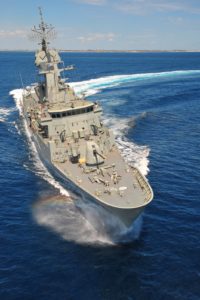
SeaPower:
BAE Systems Australia has won a $32 million, three-year contract to provide the Royal Australian Navy (RAN) with an improved anti-ship missile test capability, the company announced in a Sept. 6 release.
The Future Advanced Threat Simulator (FATS) is an airborne radar system designed to closely emulate the in-flight behavior of a range of anti-ship missiles. It has been designed to provide a test and evaluation and fleet training capability to assist with the development of advanced maritime self-protection concepts for the RAN. BAE Systems will design, develop, manufacture, test and deliver the FATS capability suite.
Work on the project will start this month and will support 20 specialist engineering roles at the company’s Edinburgh Parks facility.
“At the heart of this impressive technology is local innovation,” said Glynn Phillips, chief executive officer of BAE Systems Australia. “The simulator is an advanced capability, developed by our specialist engineering team here in South Australia. It underscores to our [Ministry of] Defence customer that we have an airborne test and evaluation capability unmatched within Australia. We are very pleased to play such a pivotal part in the development of the next generation of threat emulation capability for Defence.”
In its flight mode, the FATS is configured in an underwing pod and flown against the target ship at low altitude from a Defence-contracted Learjet carriage aircraft. This enables the FATS to simulate the flight profile of a sea-skimming anti-ship missile whilst also closely emulating the behavior of the missile’s seeker. The ship’s crew and its self-defense systems are exercised as the ship performs actions aimed at defeating the incoming missile.
The FATS is a third-generation technology that leverages BAE Systems’ existing capabilities from the successful Generic Threat Simulator and Airborne Millimeter-wave Stimulator product lines.
